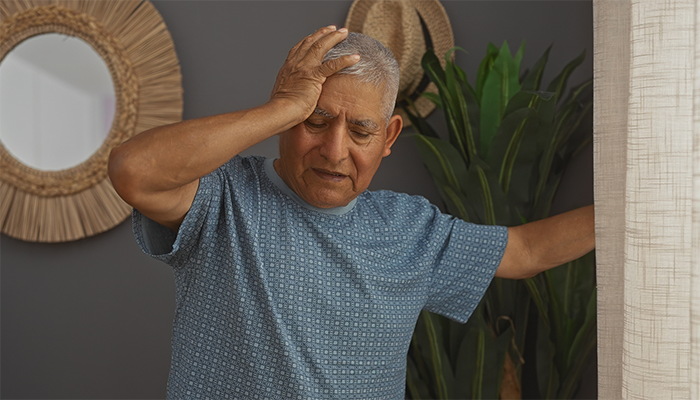Aging Answers Wilmington
Helpful tips for family caregivers
December 2024/January 2025
For older adults, feeling dizzy while standing up isn’t just uncomfortable—it can also be dangerous, leading to falls. This month we look at the importance of having a doctor diagnose the root cause of dizziness and suggest things to do at home to manage the issue. Our next topic is one at the heart of being a family caregiver: Taking care of yourself, too! We offer some ideas to support your well-being on this journey where burnout is all too common. Last, we take a practical look at the issue of junk mail and how to create a system for your relative to save what’s important and let the rest go.
Does standing up cause dizziness?
If standing up causes dizziness for your loved one, even simple movements such as getting up from the couch or table can be unpleasant. The problem may be orthostatic hypotension (OH), also called “postural hypotension,” which happens when blood pressure drops suddenly after standing up from sitting or lying down. The resulting dizziness increases the risk of falls.
According to the Mayo Clinic, treatment should look beyond the low blood pressure to the root cause. Once the root cause is under treatment, you can help your loved one adopt some lifestyle changes to help prevent or manage their OH symptoms.
First, get a thorough diagnosis. Make the doctor aware of your relative’s symptoms. They may then run a number of tests for underlying causes. The list of possibilities is long and includes high blood pressure, diabetes, heart disease, and vitamin B12 deficiency. Each of these requires treatment. Also, some medications contribute to OH by lowering blood pressure. Common culprits include diuretics, blood pressure medications, and certain antidepressants. Have your loved one’s medication list reviewed for potential side effects.
Learn practical steps for ongoing management. After identifying the root cause of your relative’s OH, the doctor will likely suggest taking some self-care steps. Following are some commonly recommended lifestyle changes:
- Slow movements. Sudden upward movements can trigger OH. Have your loved one wriggle and stretch their legs and feet before getting up. Then sit up slowly, pause, and stand gradually. If they still feel dizzy, they should sit or lie down until it passes.
- Proper hydration. One of the easiest ways to prevent OH is to stay hydrated. Typically, this means drinking six to eight glasses of water throughout the day. Check with the doctor if your relative prefers other fluids. Limiting alcohol is also important.
- Compression stockings. Depending on the root cause of your relative’s OH, these could be helpful. They can improve blood flow and reduce OH symptoms by applying gentle pressure to the legs.
- Safe environment. Falls are a major concern with dizziness! Remove trip hazards such as loose rugs, keep walkways clear, and make sure there’s adequate lighting, especially at night. In the bathroom, install grab bars and use nonslip mats.
Being proactive and making small changes can improve your loved one’s daily life with OH.
Return to topFive strategies for emotional health
Being a family caregiver has plenty of sweet moments, but that doesn’t mean it isn’t also emotionally challenging. It’s often stressful when you are searching for answers, wondering if you’re doing enough, and coping with the confusion of your changing relationship.
Here are five strategies to help you stay grounded and calm while caring for a loved one. Try them one at a time and notice what works best for you:
- Practice self-compassion. Listen to your self-talk and be as kind to yourself as you would be talking to a friend. Eliminate perfection as a goal. Small acts of kindness, whether toward others or yourself, can soothe and boost your mood.
- Connect with others. Share your feelings with friends, caregiver support groups, or a therapist to lighten your emotional load. Find a group through National Alliance for Caregiving, Family Caregiver Alliance, or the Hospice Foundation of America. Many health organizations, such as the Alzheimer’s Association, also have support groups.
- Ask for help. Don’t hesitate to ask professionals, family, or friends for support. You can’t do it all alone and stay healthy. Make a list of tasks to delegate and say a big “YES” when help is offered. It’s also okay to say a grateful “No, thank you” to offers that don’t support your needs.
- Stay present. Practice mindfulness by pausing for ten to fifteen minutes a day to take deep breaths and center yourself. Consider keeping a gratitude journal or quietly savoring a cup of tea. Such practices promote calm and let you appreciate the small joys in life.
- Seek awe. Awe happens with wondrous experiences—falling stars, fireflies, a birth, a cathedral, a song—that amaze and add new dimension to life. Make time for awe. You may find it in nature, music, art, and/or spiritual experience. Noticing and savoring such moments can refresh your spirit and help keep everything in perspective.
Creating a safe mail system
Junk mail creates an annoying and potentially dangerous situation for older adults, especially if they have dementia or mild cognitive impairment. It’s not just about clutter; important bills or tax notices can get overlooked, leading to missed payments or double payments. Worse, your relative might fall victim to a financial scam or be tempted to buy things they don’t need.
Tackling this issue requires two steps.
Reduce unwanted mail getting to your loved one. Start with these services:
- Eliminate prescreened credit offers—a huge risk for identity theft—through OptOutPrescreen.com. This will also stop insurance offers that might otherwise confuse and worry your relative, especially those that mention “Medicare.”
- Cancel catalogs through catalogchoice.org.
- Take opt-out action on behalf of your family member through the DMAchoice.org “Caretaker” registry. You can also opt out of spam email.
If undesired mail continues to arrive, contact the companies directly to request removal.
Protect important mail. One option is to rent your loved one a private mailbox at a neighborhood mailbox store. This would keep important mail such as bills and personal letters from getting mixed with other mail. Consider going paperless for recurring expenses (this requires tracking bills online).
When sorting mail, have your relative throw away what’s not needed and shred anything that has sensitive information. Then, organize the “good” mail into categories. Start with bills that need to be paid, items that require follow-up, invitations, and coupons or useful catalogs. Review them weekly with your loved one.
If managing this process becomes too overwhelming or you are a long-distance caregiver, consider the services of a daily money manager. These bonded and insured professionals can manage mail and bills. This provides stress relief for you. And less financial risk and clutter for your relative. Peace of mind is priceless!
Return to top





